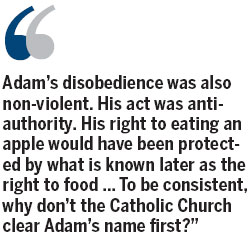Disobedience is the first sin
Updated: 2013-08-06 07:06
By Lau Nai-keung(HK Edition)
|
|||||||

Remember, eating an apple is a sin; breaking Hong Kong's law may not be a sin. Keep this in mind, and bear with me on more bunkum that follows.
The Catholic diocese published a statement titled "An urgent call for earnest dialogue and responsible action" on the front page of its weekly Kung Kao Po and Sunday Examiner newspapers respectively on July 23, commenting officially and directly for the first time on the pending "summer camp" next year.
While the title looks rather innocent and unattractive, the subtitle is much juicier. It reads: "Regarding universal suffrage and civil disobedience". Putting them side by side, one may be tempted to entertain the thought, naively, that the diocese is asking the "Occupy Central" practitioners to be responsible. In fact, the opposite is true. The sole purpose of the statement is to give the campaign a green light, so that Catholics in Hong Kong know that they can still enter heaven after participating in this action.
"It appears that the 'Occupy' movement currently being organized by some local people, as a form of civil disobedience, has come about precisely as a consequence of the above and other related concerns which must be seriously and responsibly addressed by the authorities and by all who have a stake in the future of Hong Kong," the statement reads. Not exactly a "think twice" kind of cautionary note, is it?

Vicar Michael Yeung Ming-cheung was even more explicit. Expanding on the meaning of the statement, he said: "I believe it is not a sin to join the 'Occupy' campaign. It is only an expression, though law-breaking, for civil rights. If any people, from ordinary Catholics to priests, are prosecuted for joining the campaign, the church is obliged to offer support."
Yeung's mention of sin is mind-boggling. It is common sense that the Catholic conception of sin has little to do with crime as we know it, and therefore it is not clear why "not a sin" can be used as an excuse for the church's intervention on secular affairs. Here is a definition according to the Catechism of the Catholic Church: "Sin is an offense against God: 'Against you, you alone, have I sinned, and done that which is evil in your sight.' Sin sets itself against God's love for us and turns our hearts away from it. Like the first sin, it is disobedience, a revolt against God through the will to become 'like gods', knowing and determining good and evil. Sin is thus 'love of oneself even to contempt of God'. In this proud self-exaltation, sin is diametrically opposed to the obedience of Jesus, which achieves our salvation."
Disobedience is repeatedly mentioned in the Bible as the cause of sin: "Sin entered the world through the first man and spread to all his offspring - this happened by Adam sinning. Death is a result of sin, it was the result of sin. Both were a result from his disobedience in eating the fruit of the tree." (Acts 17:26)
The Catholic conception of sin can get very technical, but sins and worldly crimes only overlap to a limited extent. The Church maintains that seven vices in particular lead to breaking one or more of the Ten Commandments. These particular bad habits are called the seven deadly sins because, according to Catholicism, they're mortal sins - sins that kill the life of "sanctifying grace". If you have watched the movie you know they are pride, envy, lust, anger, gluttony, greed and sloth. If the meaning of these words in Catholic-ese resembles English even remotely, we are all sinners, including the majority of the Catholics.
On the other hand, peeing in public may not be a sin, but it is against the law. When it is also an act of conscience directed at preventing or removing grave injustice and/or violation of fundamental rights (such as the right to relieve oneself), would the church also give the man a hand and sanctify his act of "civil disobedience"?
The bottom-line is: Adam's disobedience was also non-violent. His act was anti-authority. His right to eating an apple would have been protected by what is known later as the right to food - the "fundamental human right" derived from the International Covenant on Economic, Social and Cultural Rights. To be consistent, why don't the Catholic Church clear Adam's name first?
The author is a member of the Commission on Strategic Development.
(HK Edition 08/06/2013 page1)